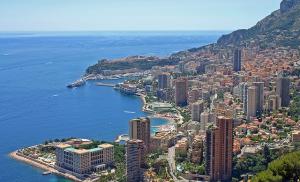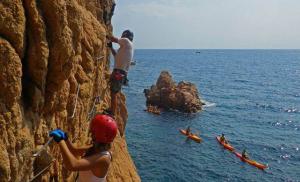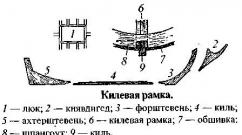Free toilets in the center of Lisbon. How to survive on a bus tour You can pay for the tour with a plastic card
We already know about trains, now it’s time to talk about intercity bus service Portugal. As you may already guess, I will talk about the fact that this species public transport, i.e. The intercity bus network is also well developed in Portugal. In some cases this will be significantly more comfortable view travel around the country rather than by rail.
Public transport:
intercity buses in Portugal
For those who do not plan long trips around the country, but prefer to spend almost all the time in one or two places, for example, stay in, and then go to the Algarve and never leave from there, then the bus and train will be more convenient than car rental. The bus gives you the opportunity to go where trains do not go.
I must say that the railway station small towns in Portugal they are often located outside the city itself, i.e. you will need a taxi or local bus to get into the city. While intercity buses always reach the city center.
The main intercity bus carrier is the company Rede Nacional de Expressos or just Rede Expressos. This company provides regular bus services only within Portugal itself. The buses are fast and comfortable, the service is normal.
On the company’s website you can select the English language and easily view all the information: schedule, ticket prices, and also buy a ticket online.
Attention! You cannot eat or litter on buses, otherwise you will have to pay a fine. During long journeys, there are stops where you can get off the bus, go to the toilet, and have something to eat. Those. if you want to leave, be sure to ask the driver how long the stop will last :)
Basically everyone arrives at airport and from there they plan all their trips around the country. In Lisbon the main bus station is called 7 Rios(Sete Rius), it is not very far from the airport.
7 Rios – Lisbon central bus station
Address: Praça Mal. Humberto Delgado, 1500 Lisboa
How to get to the central bus station 7 Rios?
From the airport:
In addition to taxis, you can get there by bus Aerobus, route 2.
You can find out more about this bus, schedule and ticket price. The bus comes directly to the bus station itself, there is no need to go anywhere. The same is true in the opposite direction.
From the city: can be reached by train, metro and regular bus, Certainly. The railway station is called 7 Rios(Sete Riusch). The metro station is called JardimZoológico(Jardin Zoologiku). Buses: 31, 54, 70, 701, 716, 726, 746, 755 , 758, 768.
In general, both metro and railway stations are located in the same building... I would say a building. There is only one exit from there and it is located opposite the bus station. You need to cross a small path and go up the stairs or on an escalator to the bus station building.
Interesting! The bus station is located next to the Lisbon Zoo. Maybe someone will want to have some fun while waiting for the bus. I highly recommend it!
How much will it cost to travel intercity bus? Next, I would like to carry out an analysis similar to what I did for trains, i.e. most popular destinations Lisbon–Faro, Lisbon-Porto and Porto Faro.
How to get from Lisbon to Porto by bus?
Travel time:
3:30 – 4:00 depending on departure time and route.
Ticket price:
regular ticket- 20 euros, round trip – 36 euros.
How to get from Lisbon to Faro by bus?
Travel time:
3:15 – 4:00 depending on departure time and route.
Ticket price:
regular ticket - 19.5 - 20.0 euros, round trip - 35.2 - 36.0 euros.
Some trips are made by another carrier company - Mundial Turismo(Mundial Tourism).
How to get from Porto to Faro by bus?
Travel time:
8:30 – 13:00 depending on departure time and route.
Ticket price:
regular ticket - 31 euros, round trip - 55.8 euros.
Attention! There are very few direct routes towards Porto Faro. Please pay attention to possible transfers.
It is possible to buy a ticket online on the carrier company’s website (link above in the text). During the hottest period, literally and figuratively, i.e. in July-August this would be very useful. And just to avoid standing in line...
A few important points:
- How to find where the bus stops in the desired city?
Typically ticket sales points are stopping points(). If there are two or more ticket sales points in a city, then, as a rule, they stop at the first one on the list.
- It is possible to book a ticket in advance, 14 days before the departure day.
- If you were unable to print the ticket you purchased online, you need to save the reference number and show it at the box office or use an automatic terminal to print the ticket.
- If you missed your bus, then purchased online tickets They are not exchanged and money is not returned.
- Baggage: You can carry up to 20 kg of luggage free of charge. If the driver thinks that you have exceeded the limit, then you will have to pay for the excess.
- You can always buy tickets in person in advance, of course.
- Any information about operating hours, schedules, as well as booking a ticket from Lisbon can be done through the call center 707 22 33 44 (daily from 8:00 to 20:00). They speak English.
Important! If you have just booked a ticket, you must appear at the ticket office no later than 1 hour before your trip and redeem your ticket.
A long-term bus tour abroad or in your own country is a test for your social skills, stamina and patience, health, stamina and enthusiasm. Despite all of the above, a bus tour also means significant cost savings, great pleasure from staying in new places without all the difficulties, and an opportunity for people of any income to see the world. Young people often easily survive all the ups and downs and inconveniences, but tourists over 25 better know what to prepare for in order to get more pleasant experiences than negative ones.
The main and basic principle is compactness. There are a lot of people on the bus, but there is not enough space, so try to pick up all the things you need on the road as small as possible or easily foldable.
First of all, the most relevant - dry closet. The travel agency will assure you that the bus is equipped with an excellent toilet, and no difficulties in this sense will arise. In fact, most often they save on this “accessory”, and at the very beginning of the trip the guide will give you such a lecture that you will simply feel embarrassed to use the toilet on the bus. And this is actually justified. And even if you are very lucky and everything is fine with him, there are a number of other problems:
— the room with the dry closet is very cramped, so much so that in front, where the seat ends, the door already begins;
— the room is not so airtight, so if there is an odor, it most often spreads throughout the entire salon;
- don’t forget that you need to acquire the talent to do everything silently.
That is why this method of understanding the world around us is contraindicated for travelers who have relevant problems; the rest are advised to drink less, and not eat as much as you are used to at home, and to take advantage of every opportunity during excursions or in hotels. Because drivers also very - VERY - do not like to stop somewhere on the side of the road (in many countries this is simply prohibited) for appropriate needs. And you often arrive at the hotel after midnight or later.
Seat on the bus. Very often, a tourist’s seat on the bus is assigned immediately after purchasing a ticket. Due to the above issue, the fact that the small TV is located at the front of the bus, and the fact that you will most likely want to ask the guide something during the trip, it is better to make sure that you get a seat closer to at the beginning of the bus or in the middle. In some regular buses the dry closet is located in the middle: in this case, you need seats a couple of rows from the toilet in front, and further. You shouldn’t take the very first places either, because the tourists sitting behind will not give you peace of mind with questions for the guide, and you will become a free information desk.


In the end, there is simply less motion sickness in the front.
It is definitely better to take a seat by the window, especially if you are not a hyper-communicative person and like comfort: people passing through the cabin will touch you, your things, and carry smells past; if you sit by the window, you can casually tune out the view passing by, and if you sit by the aisle, you will somehow either be bored or entertain the passengers sitting to the right and left.

Comfort and efficiency. The bus often does not go according to schedule, tourists sometimes get delayed on excursions, and it is not uncommon to have to wait for people who have lost track of time when you are allowed to go shopping or just take a walk after the excursion. Long-term travel, arrival and check-in at the hotel at one in the morning, a couple of nights on the bus, a couple of stops for personal hygiene in public places, where everything is about 30 people, 40 minutes and only 6 sinks for each floor - in general, a normal thing for bus tours. And when moving from a bus to a hotel, you need to quickly pick up your things and not delay yourself and those around you.
1. Mobility and efficiency are very important: one small suitcase that you can lift without any problems (or better yet, transport on wheels, but the suitcase still shouldn’t be heavy) yourself; Everything in the suitcase is laid out so that you can quickly and easily find, take out and then put away your essentials. It’s even better to have, in addition to your personal bag (for women) and suitcase, a small travel bag in which you can put everything from pills to personal hygiene products, a book, a small towel, etc., and send it to the top shelves in bus. Collect travel bag and a suitcase so that when you go from the bus to the hotel for the night, you don’t need to take your travel bag with you.

2. I strongly advise you to pay attention to comfortable clothes and shoes, in which you can spend hours sitting in a cramped space, and later several hours without a break on excursions, and which are also easy and quick to put on and take off; and for the appropriate, excuse me, underwear. The latter also applies to the fair half of humanity: ladies and girls, if you don’t pick up several options for a comfortable “top” for your trip, hell awaits you.
3. Be sure to stock up on a small, soft, perhaps even appropriately shaped (P-shaped) pillow for your trip. So that your neck doesn’t hurt and it’s more comfortable to sleep: your head on the pillow won’t be tossed back and forth. It's best to have an inflatable one with a fabric covering - so it doesn't creak and it's more comfortable for you. An inflatable pillow will also save valuable space in your luggage.

Medicines. When traveling, it often happens that your body is in critical conditions and bothers you less than at home. But in a state of stress from a completely disrupted regime, a constantly uncomfortable body position, a change in diet and a huge increase in physical activity on the body, completely opposite cases are not uncommon when, in the presence of certain diseases, the state of health worsens. Therefore, it is important to have with you all the medications that you take constantly, with a reserve, and also to provide for all the main scenarios and take with you additional medications for digestion, flatulence, edema, etc.

In any case, it is very advisable for everyone else to have in their travel first aid kit: anti-allergy tablets that interact without problems with alcohol, for example Kestin (few people know their body completely, and on your trip you will most likely visit restaurants, as well as try local exotic cuisine and vegetables and fruits), a remedy like metronidazole, a remedy for heartburn (better in combination: a remedy to calm the stomach and esophagus in general), a good pain reliever, anti-inflammatory ointment, a lot of plaster, chlohexidine (it will help, and if your throat hurts, it will disinfect the wound and etc.), a compression bandage (for those who are not used to walking a lot) and appropriate tablets, like Detralex, would not hurt.
Nowadays, in some countries, a number of medicines are prohibited from being transported across borders, keep this in mind. Of course, you can rely on local pharmacies that you come across along the way (if you come across them), but are you sure that you can explain to a foreigner what exactly you need?
By the way, many brands offer a special plastic case with one lid, divided into many cells inside. At first glance, you might think that it is extremely convenient, but, as a rule, the tight plastic latch is difficult to give in, and there are no separate lids on each cell. As a result, if you jerk, shake when opening, or even worse, knock over the open box, everything will scatter on the floor, and/or will also be mixed up and become unusable. So it is better to transport medications in separate or original packaging.
Addition on clothes. In addition to what was described above, do not forget that it can be hot on the bus and cold outside, so a sweater, jacket or any other non-bulky outerwear that can be easily and quickly thrown on will not hurt in the cabin.
Shoes should be strong, comfortable, not new (guaranteed they won’t squeeze or rub) and not too hot, and it’s highly desirable to be closed (closed room, a lot of people, a lot of walking, you know).
You may need special preventive tights or knee socks to prevent your legs from getting tired - constant walking, jumping from the bus and back: this is not easy for trained people, especially for those who are not used to moving a lot.
Nutrition. Be sure to take tea with you, as well as camp semi-finished products, from which in five minutes you can make a more or less complete ready-made hot dish using boiling water.
During long hauls, stops at restaurants are often not provided, and even if you stop at an eatery, you very likely won’t find anything edible either within your means or in principle, and, believe me, you won’t get far on energy bars and nuts. Take with you a bag of vermicelli/dry puree and other analogues in special glasses (instant preparation) so that you have at least a surrogate of hot food on hand (there must be a device with boiling water in the cabin). No matter what they say about such products, it’s better here with them than without them.
Do not take canned food with oil (you will get everything dirty), eggs (there will be nowhere to decompose) or chicken and perishable foods.

.jpg)
Cosmetics and protection. It will be much more convenient for you to use multi-purpose products, for example, shampoo and shower gel in one bottle, body and hand cream, shampoo after which no conditioner is required, etc. This will save precious space in your luggage, and there is no need for a shower will carry with him an armful of tubes and jars.
Try not to use cosmetics, deodorants and perfumes with intense, pungent odors - again due to close contact with people in the close space of the salon and the residence of two not close people in the same room.
Don’t take new products on your trip, choose only proven ones: your skin will already be under enormous stress, don’t aggravate it.
Finally, choose only reliable means of protection - we mean deodorants. Often, a trip between two “souls” can take up to 18 hours, and this is subject to constant excursions and shopping runs. In addition, in 50% of tourists in such conditions, the metabolism begins to dance the mamba. Therefore, enlist the support of reliable, appropriate means, and, if necessary, ask friends/relatives for advice on choosing.
Due to active dehydration and pollution, you will need at least 2 basic products: a moisturizer and an excellent, but gentle cleanser (foaming face wash).
An antiseptic gel or wet wipes with the appropriate composition would be very, very useful: to wipe your hands in the salon after an excursion or before eating, and not only your hands, and not only in the salon.
Small (0.33) bottle of water. Take a fresh one for sightseeing on foot. If you don't know what dehydration is,... bus tour you are in danger of getting directly acquainted with: lack of strength, brain function, falling on the road.
Last but not least: packaging for souvenirs. Strange as it may sound now, containers with strong walls will not hurt you at all: for foreign chocolate, some fragile crafts, and, in principle, for expensive purchases. If you have free space in your suitcase, take a strong box with you: believe me, you won’t regret it.
But in fact, everything is not nearly as scary as it might seem. Just prepare in advance and get immeasurable pleasure from the trip!
Where and when can I find out the departure time and bus number?
On the eve of departure in the evening (after approximately 16:00), tour operator employees will call tourists at the numbers that were specified when booking the tour. The following information is provided: the number and color of the bus, the time the bus arrives at the departure point.
Be careful ! If we have not reached you by phone, and you do not have the opportunity to check the information on our website, then contact us yourself, but not earlier than 16:00 (Moscow time) the day before the vehicle leaves.
What are the features of Euroclass and tourist class buses?
If the website indicates that your bus is a “foreign car”, then, as a rule, it is a Korean or Chinese bus: HIGER, Yutong, HYUNDAI.
Tour class– buses that are most often intended for sightseeing tours, but are also sometimes used on trips to the sea to make tour prices more affordable. The tourist class includes: HIGER, Yutong, HYUNDAI, etc. The bus interior is equipped with: air conditioning, TV-DVD, reclining seats.
Euroclass– buses with increased comfort. Due to their comfort, vehicles of this class are used when traveling long distances. These buses reduce the risk of frequent breakdowns on the road (running gear, air conditioning systems). For convenience, the cabin has reclining orthopedic chairs, air conditioning, TV-DVD. Representatives of the Euroclass are buses: MERCEDES, SETRA, KING LONG.
Which monetary currency in Abkhazia?
The currency in Abkhazia is the Russian ruble.
Can you pay for the tour with a plastic card?
You can pay with a plastic card at the sales office or through the website.
Are tourists insured on the way and during vacation?
All tourists on bus tours are insured. During vacation, insurance outside of transport is not required, since unified compulsory medical insurance policies have been introduced. During your holiday in Abkhazia, insurance also covers the duration of your holiday.
Tour buses and other transport issues
Even though we are major tour operator for bus tours, we do not have our own buses. The policy of our company is that we separate excursion and transport business.
We are professionals in organizing tourism products.
Where do the buses depart from?
- Select your departure city in the upper left corner on the main page of the site.
- Next, follow the link on the right side of the “Tourist Departure Places”.
Does the tour operator have the right to change seats on the bus?
The tour operator reserves the right to change the tourist’s seat on the bus in the following situations:
- If tourists board incorrectly on the bus (everyone sits by the window). In this situation, the tour operator has the right to change the seat, having previously notified travel company about this;
- when combining flights in rare cases, change is possible seats. The tour operator will inform you about this a day before departure.
What documents are needed to travel to Kaliningrad?
Do you need foreign passport, Russian Federation passport.
Do you organize tours for school groups?
No. Children are transported by bus during daylight hours. It is prohibited to transport children's groups at night without special permission.
I booked a tour with sharing, when will I know if I have found a partner?
Information will be available 3-5 days before departure. If accommodation is not found, the tourist will be asked to pay extra for a single room or be canceled from the flight with a full refund of the amount paid.
What acts as an additional places in the room?
Depending on the hotel, you will be provided with: a folding bed, a sofa, an armchair.
What are the payment terms for the tour?
It is necessary to pay 30% of the tour amount within 3 calendar days from the date of confirmation of the application.
The full cost must be paid no later than 14 (fourteen) calendar days before the start date of the trip.
When booking excursion tour The following payment terms apply to Kaliningrad:
- 50% prepayment – within 3 calendar days after confirmation of the application;
- 100% payment – 30 days before the start of the tour.
Can the bus pick me up at a point along the route?
No. Boarding is carried out only at strictly designated departure points.
Long bus journeys, and we are referring specifically to them in this article, have some nuances, neglect of which leads to very negative consequences. Unhappy travelers arrive at their destination tired, sleep-deprived, with numb legs and crooked necks. They remember the night on the bus as the most bad dream and vow never to use this mode of transport again. And it’s completely in vain, because ensuring yourself comfort and safety on a trip is not at all difficult.
Safety
1. Evaluate the route
Try in any way to find out about the route you are going to take. If buses regularly crash into the abyss, robberies or other accidents occur along the route, then perhaps you should change the route to a safer one, or at least choose a daytime route.
2. Choose first class
In many countries, several transport companies operate on the same route, and their prices can vary significantly. How are savings achieved? Maybe due to the bald tires, lack of air conditioning and the presence of only one driver who will drive you all night without shifting? Or maybe your bus will stop in every village and pick up everyone, so that there will be some people constantly jostling around? In any case, you need to think about whether saving a few dollars is worth your peace of mind and safety.
3. Luggage
Before boarding the bus, put all your valuables in a small bag or backpack and do not part with it for a minute. Take it with you at bus stops. While moving, it is better to hold it on your lap or, if it is in the way, put it on the floor and step on the belt with your foot. In this case, even during your sleep, nothing will happen to it.
4. At the bus stop
If you want to get out and warm up, be sure to check with the driver about the duration of the stop. Remember the bus number and where it stops. It is better not to stray too far from a bus station or bus stop unless you want to get acquainted with the criminal life of this settlement, which in such places is usually especially lively.
Comfort
1. Choosing a location
Not all seats on the bus are the same. From a safety point of view, it is always better to choose seats in the middle, since according to statistics from insurance companies, most problems occur in a frontal collision or rear impact.
In terms of comfort, there are many more factors to consider.
- Near a window or aisle? Many people choose a seat near the window for the beautiful views. In addition, the surface of the window gives you the opportunity to lay your head on it and sleep. However, at night you still can’t see any beauty, and after half an hour your curved neck begins to go numb, so all the advantages of a window seat may turn out to be insignificant. But near the aisle you will have more space and will even be able to stretch your legs.
- Front or back? Remember that in the rear seats you cannot recline the backrest and there is more vibration there. If you sit in front, you will have to squint all the way from the headlights of oncoming cars and contemplate all the bends of the road surface. Also a pleasure for everyone.
- Near a man or a woman? If there are no numbered seats on the bus and you can choose where to sit, then first of all evaluate the overall adequacy of the fellow traveler, and then his size. Sitting all night next to a body that has spread across one and a half seats can only be wished on the enemy. And gender is a matter of taste. :)
2. Light and sound insulation
The first time you ride a bus, you look at all these people who took earplugs and a sleep mask with them with surprise: “Here you go, sissies!” But then you quickly begin to envy them and reproach yourself for your lack of foresight. Don't repeat this mistake. It is difficult to sleep on a bus at night, and without these cheap devices it is almost impossible.
3. Blanket and pillow
Yes, of course, we are not talking about those familiar objects that we use at home. As a pillow, it is better to take a special inflatable donut that supports the head and neck in an optimal position. This is a brilliant invention of mankind, which your crumpled jacket or bag will never compare with.
As for the blanket, you should take a light blanket or a long jacket on the bus that you can throw over yourself. Sometimes the temperature difference along the route can reach several tens of degrees (especially if the bus passes through mountainous areas), so if you don’t want to shake half the night from the cold, then you should take this circumstance into account.
4. Drinking and toilet
What kind of comfort can we talk about on a trip if you are thirsty? Even more painful moments come when you realize that you want to go to the toilet, but have to drive and drive to the nearest stop. Dealing with these two types of discomfort is very simple.
- First, always take a bottle of water with you on the bus. Even if it should be there, take it anyway.
- And second: at every stop, think about visiting the toilet. Don’t pay attention to your laziness and all these “I don’t think I want to” and “it’s bearable for now.” At the same time you will warm up.
What to take with you
Traveling by bus is not a space flight, but you need to prepare for it no less carefully. While you're on the move, you'll be sealed into a fairly small space in your seat, so it's worth making sure you have everything you need at hand in advance. Here's a short list to guide you.
- A small handbag or body wallet with the most valuable things. Documents, money, tickets, cards, smartphone and so on.
- A backpack or bag with things you might need.
- Sleeping items: earplugs, light-protective mask, blanket or jacket, inflatable pillow.
- Entertainment: smartphone, book, player, tablet.
- Medicines that may be useful to you for motion sickness, poisoning, or that are prescribed to you by your doctor.
- Water and, if necessary, a small snack: nuts, energy bars, candy.
- Toilet paper!
We traveled from Tallinn to Riga on a comfortable bus. It had so many different bells and whistles that I decided to write about them all separately.
The bus drivers are very polite. Firstly, they helped everyone put their suitcases in the luggage compartment. Secondly, as soon as we got on the bus, they told us about everything that was there and what we could use. In addition, the drivers are dressed very politely. 
Upon entering the bus, you do not notice anything unusual: 
But there are monitors built into the back of each chair: 

It turns out that while driving we can listen to music, watch movies, and surf the Internet for free. And most importantly, there is free Wi-Fi on the bus. 
You can see on the map where the bus goes: 
To listen to music and movies, you need to use your own headphones or buy from drivers for 1 Euro: 
Someone played games: 
Having sat down, the large distance between the front seat immediately catches your eye: 
Above us everything is the same as what we see on buses in Russia: air conditioning, calling the driver. Only unlike our buses, it all works. 
Another important thing is the 220 Volt socket, which is located under the seat: 
Let's move on to more global things. When entering the bus, on the left there is a machine with coffee, tea, water, etc. All this is also free and unlimited. 
And finally, the most important thing is what is behind the door with the inscription “Toilet”, which you should never enter in Russia. Here we were told: “The toilet can be used while moving, but not while standing.” We open the door - no smell. Directly ahead is the toilet. It doesn't look completely clean, but that's because of the water. 
To the right of the toilet in the wall there is a window for ventilation: 
To the left of the toilet there is a sink and liquid soap: 

All of the above things can be used for free. The European bus is very comfortable. For reference: the distance between Tallinn and Riga is 313 km, which the bus covers in about 4-5 hours. Ticket price 15 Euro.














